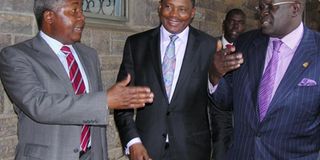Leave courts to interpret law, MPs told

From left: Senate Deputy Speaker Kembi Gitura, National Assembly Speaker Justin Muturi and University of Nairobi Vice-Chancellor George Magoha after a public debate at the institution on July 28, 2014. PHOTO | SALATON NJAU
What you need to know:
- There have been disputes between Parliament and the Judiciary.
- The public lecture was the first of Parliament Week and was on the principle of separation of powers
Parliament must respect the interpretation of the law by the Judiciary, heads of the legislative arm have been told.
There should be no confusion about the roles of Parliament and the Judiciary, lecturers told National Assembly Speaker Justin Muturi and Senate Deputy Speaker Kembi Gitura during a public lecture at the University of Nairobi.
Monday's public lecture was the first of Parliament Week and was on the principle of separation of powers, a talking point of the 11th Parliament.
There have been disputes between Parliament and the Judiciary.
“As long as you don’t respect the interpretation of laws by the Judiciary, the confusion will continue,” said Prof Edward Kisiangani, who teaches political science at Kenyatta University.
According to Prof Okoth Okombo, deliberate disobedience of the law, also known as impunity, is the biggest problem in Kenya and the source of disputes between the Judiciary and Parliament.
“We’re not saying that MPs can’t interpret the law. Some of them are very good lawyers in their own right. It’s only that it’s not their duty,” said the Linguistics professor.
The academic used an analogy from football to explain the difference between the mandates of the Judiciary and Parliament.
He equated the Legislature to a team manager and the courts to a referee.
“The team manager must understand the rules but the referee’s decision is final,” said Prof Okombo.
Political Science lecturer Maria Nzomo said the three arms of government need to work on the basis of mutual respect.
“You should exercise restraint with respect to the other arms of government,” said Prof Nzomo.
INTERFERENCE
Mr Muturi and Mr Gitura argued that it was unfair to expect Parliament to have its work stopped by the Judiciary, which they said should only step in after laws have been passed or the Houses are through with a matter.
“Nobody has the right to interfere. The moment the Judiciary tries to stop the National Assembly or the Senate from doing its work, that is interference,” said Mr Gitura.
He said if there is continued interference in Parliament’s work by the Judiciary, Kenya would go into a “Judiciary dictatorship”.
“If we cannot impeach a governor because of the Judiciary, then we will only impeach after they have given us guidelines,” said Mr Gitura.
“Parliament represents the will of the people and exercises their sovereignty. Parliament’s job is to legislate. Allow Parliament to do that and if there are any provisions or laws that are either unconstitutional or illegal, go to court and seek to know whether it complies with the Constitution,” said Mr Muturi.
In the last one year, Parliament has had disputes with the Judiciary over the impeachment of Embu Governor Martin Wambora by the Senate and the oversight of the Judiciary’s spending by the National Assembly.
Matches between members the National Assembly and the Senate are set for the Nyayo National Stadium on Thursday.
An open day will be held at Parliament’s public parking space opposite Sheria House on Friday.





